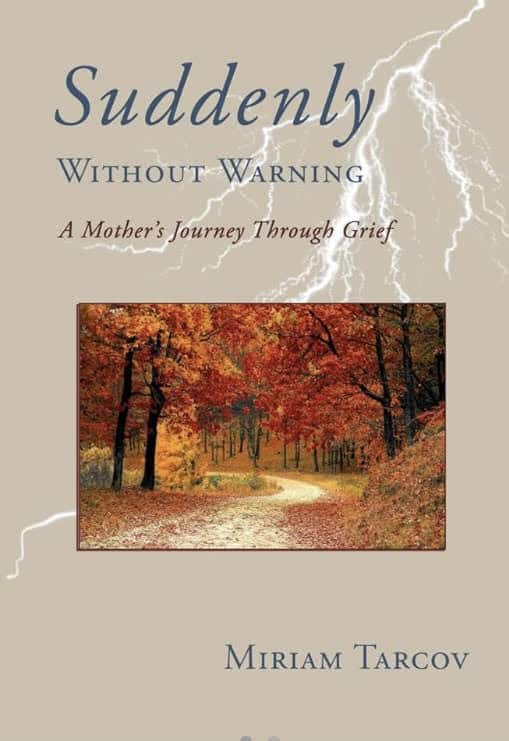Suddenly Without Warning is Available Here
Miriam Tarcov’s first child, Joshua, at the age of 18 died unexpectedly in a car accident. This book describes grief’s intimate journey for Miriam and her younger daughter Tara. In her introduction Miriam writes:
My path through grief moved back and forth, feeling gratitude, sorrow, appreciation, back and forth. Experiences were always in transition. Practicing an attitude of loving kindness toward myself, I let the pain and sorrow enter and stay for as long as necessary. It helped to ease the searing pain of grief, without falling into denial, bargaining or depression.
Foreword by Judith Lief
This book is about love and it is about grief. It is about being a parent and it is about losing a child “suddenly and without warning.” It is a look at grief over the course of many years and through many stages of life. Unlike many discussions of this topic, the emphasis is not primarily on the immediate shock of such a loss or on the idea of getting over grief, or “moving on.” Instead, the author emphasizes the transformative power of welcoming an inter-weaving of grief and loss, love and memories, throughout life.
Tarcov bases her book on her experience of her son Josh’s death in a car accident at the age of 18 and the deepening of her relationship with the reality of that sudden loss over a period of more than 30 years. This book is an insightful and loving story of one woman’s loss and grief. And it is more than that. It challenges readers to explore their own relationships to death and to the unpredictability of life.
The title of Tarcov’s book—Suddenly Without Warning—comes from a traditional Buddhist contemplation of the truth of impermanence. In this practice, which is meant to be done on a daily basis, students reflect on the reality of death and its many dimensions, from everyday losses to physical death. It is quite direct: in order to face death more straightforwardly and with less fear, we first need to overcome our denial and avoidance of this reality. By working on our own relationship with death in this way, not only do we cut through our own fears, but we also grow in our ability to help others. We become steadier, less thrown off by the shocks and turns of life. Therefore, this practice is highly regarded.
It is powerful to remind ourselves daily how precious life is and how quickly it is over, and there are many practices to help us do so in Buddhism and in other spiritual traditions. But no matter how diligently we have trained ourselves, there are times when the shock of an unexpected death devastates us. A sudden accident such as Josh’s is a big dose of the reality of death. It brutally cuts through our illusions on the spot! It doesn’t get much more real than that.
That raw place is what gave birth to this book. As I watched how my friend Miriam made her way forward and as I listened to her observations about what she was going through, I realized that it could be a real benefit to others if she could write something about her experience. I encouraged her to think about it. And now, after these many years, I am so grateful to see her completed manuscript and to offer a short foreword.
At the time of Josh’s death, Miriam was already a seasoned practitioner of Buddhism. She was a close student of the Tibetan meditation master, Chögyam Trungpa Rinpoche. Under his direction she learned the importance of cultivating mental stability and clarity, not as an escape from life and its pain, but as a way to stay present and open, no matter the circumstances. That aspiration to stay with experience, no matter how challenging, became her support and guide through the intensity of her loss and throughout her life.
In the immediate aftermath of Josh’s tragic accident, Miriam also drew on Buddhist teachings on what happens at the moment of death and in the following few days. She described how we can help support a deceased person in their journey through the bardo, the intermediate state between one life and the next.
One of the most inspiring aspects of this book is the way Miriam explores her inner life and the workings of her mind and emotions in dealing with Josh’s death both at the time of this death and over the course of many years. She describes how Josh’s death —frozen in time and memory—is in a continual dance with her own evolving experience of life and its many stages of aging and growth. Throughout, Miriam describes her mental states without judgment but with interest and curiosity and kindness.
In her book, Miriam mixes insights gleaned from her years of training with her personal story in a simple and accessible way that can benefit readers of any background. Miriam’s story is an example of the very human struggle to apply spiritual training on the spot in the thick of everyday life. She does not romanticize it—she shows us that it can be done.
Judith L. Lief, author Making Friends With Death: A Buddhist Guide to Encountering Mortality
Excerpt from Joshua’s Sukhavati Ceremony
Then it was time for me to say a few words. Jose and I approached the microphone. I paused to put on my glasses and open my notes. I needed a few seconds to collect myself, to look at Josh’s body, and to scan the room. Jose reached for my right arm, found my hand, and held it tightly against his solar plexus. I could feel his breathing, which seemed faint and deep. While I spoke, I could feel Jose’s presence, weak and trembling. I was speaking for both of us. We had been in front of microphones many times before, years ago when we gave presentations on the art of mandalas or the feminine principle. So much time had passed. Neither of us would have ever imagined that we would be together again in such a public fashion, hands entwined, in order to say goodbye to our firstborn child.
There are no words, even though I’ve written down a few, to express my appreciation and love for our son. He has given us great gifts, and I ask you as his mother to give him the gift of letting him go. Joshua’s death arose like a thunderbolt in a very clear blue sky. It arose like suddenly waking up from a dream or the passing of a single thought.
I am most grateful for having stumbled upon a legacy of teachings which is simultaneously profound and simple. These teachings have trained me to meet my only son’s death with one-pointed courage and a very tender heart. Joshua’s compassionate activity, his relaxed disposition and appreciation of the joy of human existence touched many people, many
of whom are here today.
Birth, death; happy and sad; day, night; emptiness, fullness. These are the steppingstones
to realization. Now Josh’s journey is a solitary one, yet it is embraced by the sanity and love of his family, friends, and the lineage of teachers.
Goodbye my precious son.
When I finished my remarks I turned toward the casket, bowed, and said goodbye to my
son.












